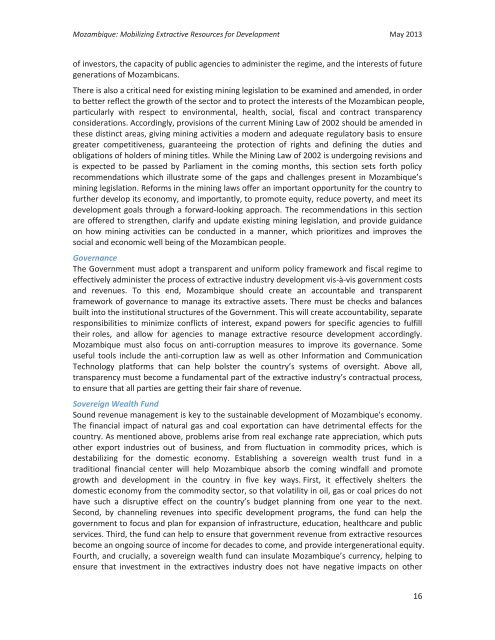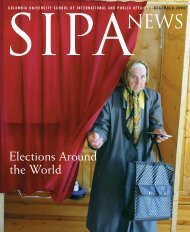Mozambique - School of International and Public Affairs - Columbia ...
Mozambique - School of International and Public Affairs - Columbia ...
Mozambique - School of International and Public Affairs - Columbia ...
You also want an ePaper? Increase the reach of your titles
YUMPU automatically turns print PDFs into web optimized ePapers that Google loves.
<strong>Mozambique</strong>: Mobilizing Extractive Resources for Development May 2013<br />
<strong>of</strong> investors, the capacity <strong>of</strong> public agencies to administer the regime, <strong>and</strong> the interests <strong>of</strong> future<br />
generations <strong>of</strong> Mozambicans.<br />
There is also a critical need for existing mining legislation to be examined <strong>and</strong> amended, in order<br />
to better reflect the growth <strong>of</strong> the sector <strong>and</strong> to protect the interests <strong>of</strong> the Mozambican people,<br />
particularly with respect to environmental, health, social, fiscal <strong>and</strong> contract transparency<br />
considerations. Accordingly, provisions <strong>of</strong> the current Mining Law <strong>of</strong> 2002 should be amended in<br />
these distinct areas, giving mining activities a modern <strong>and</strong> adequate regulatory basis to ensure<br />
greater competitiveness, guaranteeing the protection <strong>of</strong> rights <strong>and</strong> defining the duties <strong>and</strong><br />
obligations <strong>of</strong> holders <strong>of</strong> mining titles. While the Mining Law <strong>of</strong> 2002 is undergoing revisions <strong>and</strong><br />
is expected to be passed by Parliament in the coming months, this section sets forth policy<br />
recommendations which illustrate some <strong>of</strong> the gaps <strong>and</strong> challenges present in <strong>Mozambique</strong>’s<br />
mining legislation. Reforms in the mining laws <strong>of</strong>fer an important opportunity for the country to<br />
further develop its economy, <strong>and</strong> importantly, to promote equity, reduce poverty, <strong>and</strong> meet its<br />
development goals through a forward-looking approach. The recommendations in this section<br />
are <strong>of</strong>fered to strengthen, clarify <strong>and</strong> update existing mining legislation, <strong>and</strong> provide guidance<br />
on how mining activities can be conducted in a manner, which prioritizes <strong>and</strong> improves the<br />
social <strong>and</strong> economic well being <strong>of</strong> the Mozambican people.<br />
Governance<br />
The Government must adopt a transparent <strong>and</strong> uniform policy framework <strong>and</strong> fiscal regime to<br />
effectively administer the process <strong>of</strong> extractive industry development vis-à-vis government costs<br />
<strong>and</strong> revenues. To this end, <strong>Mozambique</strong> should create an accountable <strong>and</strong> transparent<br />
framework <strong>of</strong> governance to manage its extractive assets. There must be checks <strong>and</strong> balances<br />
built into the institutional structures <strong>of</strong> the Government. This will create accountability, separate<br />
responsibilities to minimize conflicts <strong>of</strong> interest, exp<strong>and</strong> powers for specific agencies to fulfill<br />
their roles, <strong>and</strong> allow for agencies to manage extractive resource development accordingly.<br />
<strong>Mozambique</strong> must also focus on anti-corruption measures to improve its governance. Some<br />
useful tools include the anti-corruption law as well as other Information <strong>and</strong> Communication<br />
Technology platforms that can help bolster the country’s systems <strong>of</strong> oversight. Above all,<br />
transparency must become a fundamental part <strong>of</strong> the extractive industry’s contractual process,<br />
to ensure that all parties are getting their fair share <strong>of</strong> revenue.<br />
Sovereign Wealth Fund<br />
Sound revenue management is key to the sustainable development <strong>of</strong> <strong>Mozambique</strong>'s economy.<br />
The financial impact <strong>of</strong> natural gas <strong>and</strong> coal exportation can have detrimental effects for the<br />
country. As mentioned above, problems arise from real exchange rate appreciation, which puts<br />
other export industries out <strong>of</strong> business, <strong>and</strong> from fluctuation in commodity prices, which is<br />
destabilizing for the domestic economy. Establishing a sovereign wealth trust fund in a<br />
traditional financial center will help <strong>Mozambique</strong> absorb the coming windfall <strong>and</strong> promote<br />
growth <strong>and</strong> development in the country in five key ways. First, it effectively shelters the<br />
domestic economy from the commodity sector, so that volatility in oil, gas or coal prices do not<br />
have such a disruptive effect on the country’s budget planning from one year to the next.<br />
Second, by channeling revenues into specific development programs, the fund can help the<br />
government to focus <strong>and</strong> plan for expansion <strong>of</strong> infrastructure, education, healthcare <strong>and</strong> public<br />
services. Third, the fund can help to ensure that government revenue from extractive resources<br />
become an ongoing source <strong>of</strong> income for decades to come, <strong>and</strong> provide intergenerational equity.<br />
Fourth, <strong>and</strong> crucially, a sovereign wealth fund can insulate <strong>Mozambique</strong>’s currency, helping to<br />
ensure that investment in the extractives industry does not have negative impacts on other<br />
16

















